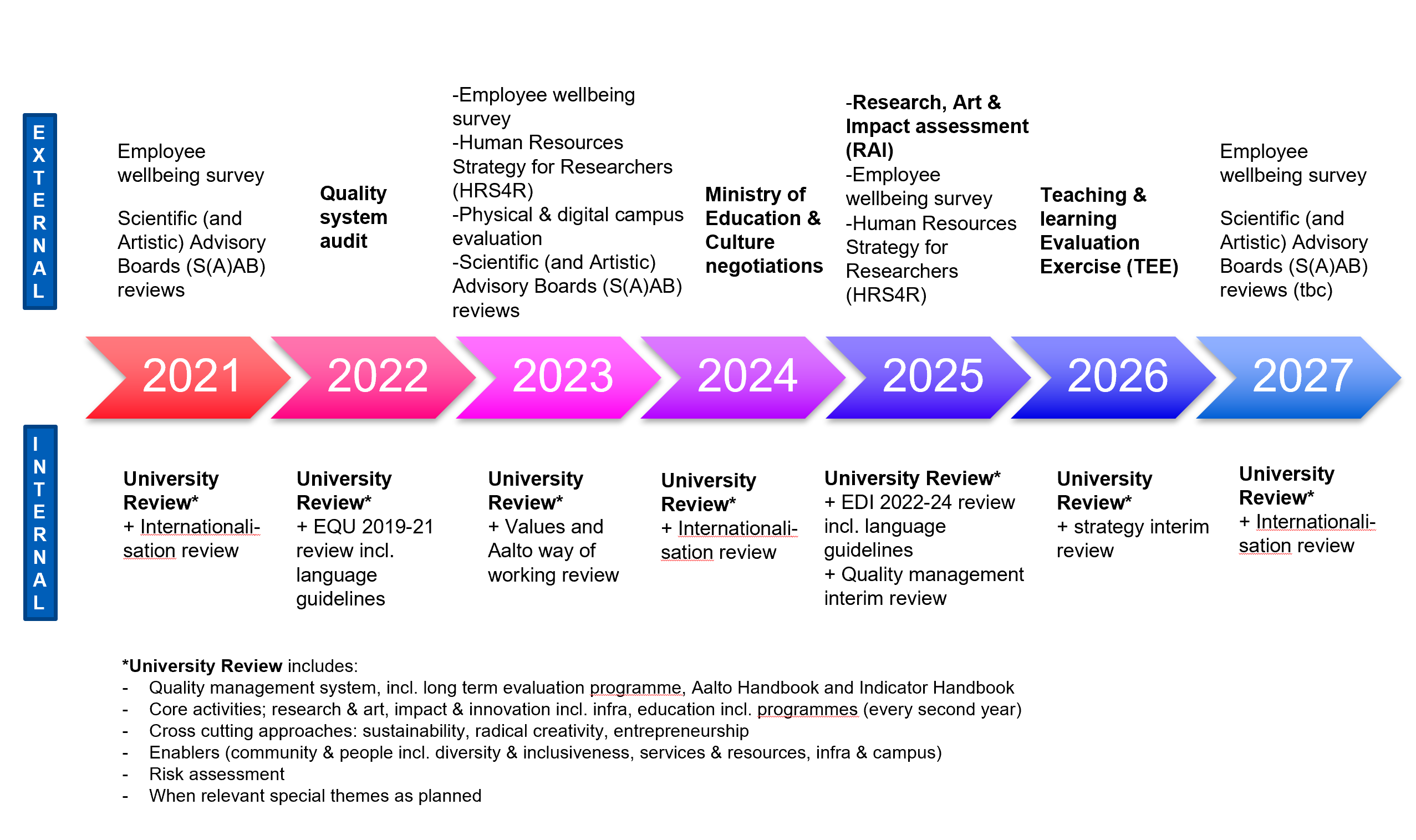The University Preview as a unique strategic process
The University Preview is a communal foresight process integral to Aalto’s living strategy that enables the university to proactively react to changes in its operating environment. The process involves foresight surveys, workshops, community events and PMT discussion. The outcomes of the Preview have been the identification of key emerging trends and developments, updates to the description of the major trends shaping Aalto (incorporated into the living strategy) and analysis of the ways in which these may shape Aalto’s core activities. For example, emerging signals and trends relevant to Aalto’s operations were identified in 2020 and 2021, such as the global sustainability crisis, the changing landscape of higher education and the shifting of the global economy and security. Additional examples of development activities being undertaken based on Preview results include the exploration and development of hybrid ways of working and the revision of the long-term campus development programme. In 2022, the Preview explored the changes in the global context. The University Preview also contributes to the other annual strategic processes—Review and Dialogue.
Developing community wellbeing through an OASIS of Radical Wellbeing
The OASIS of Radical Wellbeing is a strategic development project which builds on wellbeing expertise and delivers research-based information and tools to help Aalto community members take care of their own wellbeing so that they are able to act on the issues they consider relevant and valuable. OASIS plays a vital role in raising Aalto community members’ awareness of wellbeing, belonging and support services through facilitated dialogues, podcasts, video productions, webpages and social media, renewed Personal Impact courses and Aalto students working as Wellbeing Ambassadors. OASIS also promotes diversity skills, participation and safe conditions for working and studying.
OASIS analyses information related to wellbeing to identify load factors by combining the responses to different wellbeing questionnaires, thereby supporting the development of a more holistic view on wellbeing within the Aalto community. New solutions created through OASIS to support wellbeing include a guidance counsellor at the School of Arts, Design and Architecture, new pedagogical training for academic advisors, webpages on wellbeing in teaching and guides for developing teaching based on the results of the ‘AllWell?’ and ‘HowUTeach’ surveys. In 2022, Aalto launched the Wellbeing Desk, a low-threshold service point for personnel which aims to improve the accessibility of services and support for work ability and wellbeing. Through experimentation and pilot projects, OASIS is creating and further developing concepts, services and marketing methods that foster holistic wellbeing in the community.
Data-driven planning and management approach
The data-driven university is a holistic approach to incorporate data as a resource for collaboration and advanced analytics to develop and lead university operations. The purpose is to help students learn better, develop partnerships, find new funding possibilities and donations, serve the community more efficiently, advance sustainability and make better fact-based decisions. Centrally created and maintained dashboards are used effectively in annual planning processes, such as University Dialogues and the University Preview and Review. The dashboard of the university KPIs is monitored thrice a year by the Aalto Management Team (AMT). In addition, the school management teams, steering groups and other committees use the dashboards when relevant to their work.
Research and education leadership uses deeper analyses based on internal and external data and created by field specialists to constantly monitor, review and assess development. Our Customer Relationship Management (CRM) ecosystem uses and develops data-driven analytics for partner management and to support fundraising decisions through KPIs, dashboards and embedded reporting.
However, to properly realise the benefits of data, we also need to ensure its quality. On one hand, this requires that data governance, information architecture and data management practices be included in all development work at the university. On the other hand, proactive measures for information security and data protection are also needed to guarantee the safe and appropriate use of data.
Aalto University’s long-term evaluation programme
Aalto has employed a unique and gradually developing long-term evaluation programme since 2011 that has enabled the university to map, plan, review and follow up all quality assurance evaluations (Figure 7). In 2017, the programme further integrated annually rotating special themes that are assessed as part of the University Review.
The Leadership Support Services (LSS) prepare the evaluation programme, whereas the Aalto Management Team (AMT) approves the programme annually in the University Review, as well as the measures to be implemented based on the results of evaluations. The programme implementation and the need to update it are assessed annually during the University Review based on inputs from the Aalto community.
Figure 7. Aalto University long-term evaluation programme 2021-2027
The long-term evaluation programme ensures that Aalto’s core activities are regularly evaluated, both internally and externally. For example, the Research, Art and Impact assessment (RAI), Teaching and learning Evaluation Exercise (TEE) and Scientific (and Artistic) Advisory Board (S(A)AB) reviews are carried out at regular intervals, and their recommendations are integrated into the university’s strategic planning and other relevant activities, such as the renewal of educational programme portfolios and the guidelines for curriculum development.
The evaluation programme has brought several benefits. It has enabled the university to approach quality management strategically and from a long-term and comprehensive perspective. It has also facilitated transparency in the planning and implementation of evaluations. Long-term planning has supported continuity in evaluations and the enhancement of core activities. The programme also enables the university to undertake early preparations for evaluations and ensures a feasible workload of quality management for each year. In addition, the evaluation programme, together with the annual strategic processes, has enabled quality management to become an integral component of Aalto’s operations.